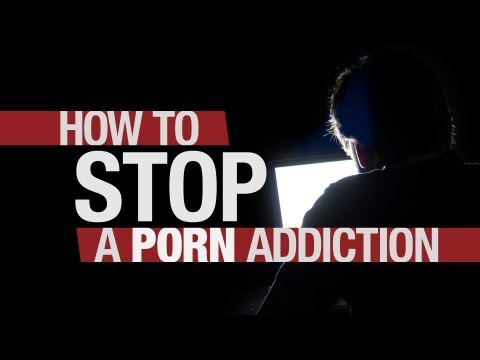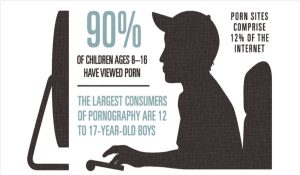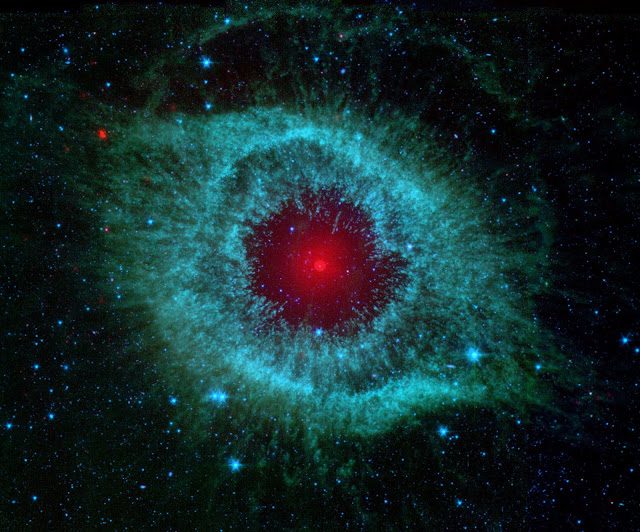Pornography is not just a ‘cultural’ problem. Pornography is also our problem. I think it’s necessary to ensure that everyone understands that this problem does, in fact, impact our community. There is a tendency to view these types of problems as problems of the outside world that we have to prevent from seeping in, as opposed to problems that we need to face and root out in our own church community. I’d like to very briefly go over three important facts about pornography:
1. Pornography is a problem in our churches
2. Pornography is a huge problem in North America
3. Pornography addiction is incredibly dangerous in its mental impact.
Porn is a problem in our churches
I’m going to share with your four (of many) testimonies of young people, all members (baptized or confessing) of the Netherlands Reformed Congregations, of how pornography has impacted their lives. These testimonies are anonymous.
A NRC wife and mother:
“When my husband first told me about his struggle with pornography I was too shocked to respond. Once that wore off I experienced much anger, low self-esteem, sadness and insecurity about our relationship. However, I am happy to know that he had the confidence and courage to tell me about it. His guilt about watching pornography is stronger than his pride to keep it hidden from me. We have become very open about the topic and discuss it from time to time. There are times that he feels the urge to look something up, but keeping communication as well as using a reliable filter for the internet on both our computer and smart phones has kept him accountable and our relationship strong. Now my trust in him has been renewed, we pray together asking for God’s forgiveness but also for His protecting hand over us.
In my perspective our community must be more open about this issue so that those who do struggle with pornography feel they are not alone and that they are willing to seek help. Without help someone who struggles with pornography will only feel hopeless and more than likely develop an unbreakable addiction. We must be realistic, realize that many people struggle and stop being quiet about the topic.”
A NRC high school student:
“I am a high school student. I was disgusted to hear a high school guy mention to his buddy, ‘I wouldn’t know what to do without data on my smart phone, then I wouldn’t be able to watch porn every night.’ What? Is viewing porn now the norm? Do guys not even realize what impact even hearing this has on girls? And why are we not discussing this issue?”
A high school teacher in a NRC school:
“As a teacher of high school-aged students I am appalled at how little education there is surrounding internet safety and pornography within our churches, homes and schools. I have spoken with girls who have become victims of sexting, heard from young men who already acknowledge they have a porn problem and have gathered from student surveys that they know that pornography messes with the mind. Many of the young people are looking for answers, but without opening the topic of pornography they feel lost and end up looking for answers in the wrong places or falling into unstable relationships.
I am very afraid for our upcoming youth and relationships. It is already obvious that porn is breaking up marriages and creating preventable problems if we would only be more open about the topic!”
And a NRC husband, who was exposed to porn at a young age and became addicted well into his teen years. He writes:
“This did not mean that from then on I was free and clear and never had to deal with the issue again—far from it. The pull of this addiction is much too strong and lasting. Thankfully I do not have the images popping up in my head from memories. However, everything around me reminds me of this “high” from store front advertisements, to suggestive music lyrics, to clothing that is too tight or too revealing. It is not the first and only thing I think of when confronted with these example but it is almost always there somewhere lurking in my thoughts. Therefore a constant guard is needed to fight against this addiction on a continuous basis. I can also say that the longer you stay “clean” the easier it becomes, now the triggers are not as frequent or perhaps as noticeable. Yet, they are always there and I am afraid they will always remain.
This constant struggle has (had) obvious strain on my marriage as I have fallen twice since my vows a few years ago. Thankfully, my wife is understanding and patient with me. She has also been my biggest help in this struggle, keeping me accountable and installing filters that monitor internet activity and block and filter out pornography. In my opinion the blockage of sites doesn’t help completely. It does make getting to the pornographic content harder but there is always a way around them and the younger and more attuned to technology you are, the quicker you will find it. The best mechanism or weapon to fight this battle other than prayer and the Lord’s help is accountability and openness. Knowing that my wife is looking over my shoulder and checks my activities it a huge deterrent and thankfully the consequence of disappointing and saddening her has more weight for me than the high of this addiction. I am afraid that others are not as fortunate. Considering how controlled the addiction is and how the images hardly plague me, in many ways I have been blessed undeservedly.
Now, the struggle is still there, but we have safeguards in place and as a couple know how to fight against and deal with the temptation better. For many, the addiction does not start after one or two instances but develops over time and therefore can be stopped, deterred and interest hopefully ended before it is addicting. Therefore, if I may offer advice, I would definitely recommend a filter or accountability program for everyone, especially families with teenage boys but also young adults. We all have the same heart. Let’s not think this fixes everything. It must be combined with supervision, education, conversation, discussion and especially prayer.”
These testimonies from people within the NRC here in North America who have struggled with pornography (and there are many more), as well as recent findings by our sister congregations in the Netherlands that show sky-rocketing rates of pornography addiction among young people in their churches, prove that this is a growing and imminent problem that demands our attention and our action.
Porn is a problem in our churches because it is a problem in our culture.
The threat pornography poses to churches and families is absolutely unprecedented in modern times in scale and severity. Just to give you a brief idea of the sheer size of the porn threat using the measurement of time:
Every second, $3,075.64 is being spent on pornography.
Every second, 28, 258 Internet users are viewing pornography.
Every second, at least 372 Internet users are searching for pornography online.
And every 39 minutes, a new pornographic film is being created in the United States.
Beyond that, the numbers get much worse. Statistics from 2013, released by the Christian anti-porn organization Covenant Eyes, revealed the following:
Global pornography revenues are estimated at about 10 billion dollars—but an estimated 80-90 percent of online porn users access free pornography online, which means that the ten billion dollars is truly the tip of the iceberg.
How bad? Researchers have estimated, after an analysis of 400 million web searches, that 1 in 8 of all searches online are for pornographic content. Computers are not the only danger—as cited in the testimony of the NRC high school girl, mobile pornography is increasing drastically in popularity. For example, an analysis of over one million hits to Google’s mobile search sites, over 1 in 5 searches are for porn. The porn industry is moving quickly to take advantage of mobile porn users, and they expect to reach sales of 2.8 billion dollars by 2015.
And teenagers are the most vulnerable target.
A 2010 survey noted that over a quarter of 16-17 year olds said they were first exposed to nudity online, even though they didn’t want to see it. However, when addiction takes over—often fueled by adolescent curiosity and developing into a powerful, mind-twisting addiction—the results are devastating. The result? More than 7 out of 10 teens hide their online behavior from their parents.
Over half of boys and a third of girls see their first pornographic image before they turn thirteen—some research says around the ages of 7 or 8. I have spoken to young men who first stumbled upon pornographic images at that age. By the time young adulthood is reached, 64-68 percent of young adult men and 19 percent of women are using porn every single week. An additional 17 percent of men and 30 percent of women are using porn one to two times a month.
This means that if you are not using pornography at all in today’s North America, you are a minority.
The porn threat is psychologically and spiritually devastating.
Pornography, because people are so visual, actually triggers a chemical reaction in the brain, releasing what are known as “erototoxins.” These erototoxins literally rewire your brain, and the images are often burned into one’s memory, inerasable.
In other words, pornography fundamentally changes how human beings think and function. The after-effects of viewing pornography are not like the after-effects of consuming drugs or alcohol—pornographic images can remain lodged in someone’s brain for decades, or for the rest of their lives.
Here are just a few of the long-lasting effects of porn use:
A diminished trust between intimate couples, as the previously mentioned NRC testimonials also reveals.
An increasing belief that monogamy is not the natural state.
An increasing cynicism concerning true, self-sacrificing marital love.
An increasing belief that marriage is not something to aspire to, but rather is sexually confining.
An increasing disdain for family and raising children.
It creates extensive psychological problems for men, including becoming more controlling, highly introverted, narcissistic, dissociative and distractible.
It results in addiction to masturbation.
It reduces women and girls to the level of objects, and change the way males view females.
Conclusion
To conclude, pornography is a real cultural problem, and is already a problem within the church community. We cannot simply attempt to keep porn out; we also must root porn out.
Pornography has the raw power to destroy the futures of an entire generation. We need to equip the youth to combat this new threat. Forewarned is forearmed.









 woman) is married, it constitutes adultery. This is not just our culture, our church, our own “little lust problem” or “bad porn habit.” This is people consciously deciding to consume other people like a product, destroying their own relationships, twisting their perceptions of the opposite sex, and creating neural pathways in their brain that will often prove almost impossible to subvert.
woman) is married, it constitutes adultery. This is not just our culture, our church, our own “little lust problem” or “bad porn habit.” This is people consciously deciding to consume other people like a product, destroying their own relationships, twisting their perceptions of the opposite sex, and creating neural pathways in their brain that will often prove almost impossible to subvert.
